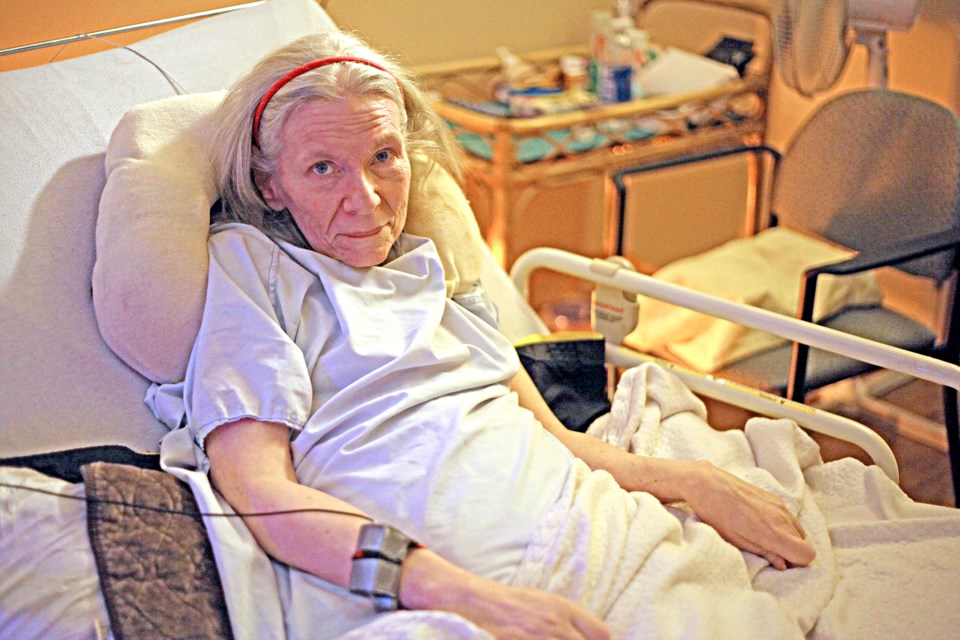The Burnaby woman trapped inside her own body says she can’t wait for the Supreme Court of Canada decision on assisted suicide.
Last week, one of the country’s top courts decided it would hear the assisted suicide case presented by the B.C. Civil Liberties Association, but it rejected a request to expedite the process.
As the Burnaby NOW previously reported, Rawnie Dunn, 62, wants the right to choose when she dies, but waiting for the Supreme Court decision just isn’t an option.
“That makes me very angry,” Rawnie told the NOW, “because people like me are driven into a corner because they have a choice of enduring a lot of pain for a long time, or dealing with more pain in less time.”
In early January, Rawnie attempted to starve herself to death for two weeks. She would drink tea in the morning and have some beef broth at night – but when more media outlets showed interest in her story, she decided to stop the hunger strike.
“There were so many phone calls and emails (to my nurse), I thought with the interest I would come back and start eating again for a few days,” Rawnie said. “But I do plan on not eating again.”
After the Burnaby NOW reported Rawnie’s story in December, she was featured in a national news broadcast about assisted suicide on CTV’s Kevin Newman Live. Two other major media outlets are also in contact with Rawnie, as well.
Despite the interest, Rawnie said she still intends to choose when she dies because the issue might be held up in the courts for many years to come, especially since the federal government has said it will challenge a favourable ruling on assisted suicide.
Rawnie was born with Friederich’s ataxia, a 65 per cent hearing loss, aggressive scoliosis, carbohydrate intolerance and heart problems. At the end of November 2012, a few weeks after her 61st birthday, she tried to take her own life before her disorder took over her life.
Her attempt was not successful, as she did not have a doctor-signed Do Not Resuscitate order. When she woke up in the hospital, the doctors gave her about 20 minutes to live, but her body kept on going.
She went from being wheelchair-bound with some mobility, to being paralyzed from the neck down, blind and sensitive to light, almost completely deaf and with a severe speech impediment because of the toll the suicide attempt took out on her.
“I really want to add my push to it,” Rawnie said. “I think it’s important, and I think it would help people after me, but I don’t think I can wait. I’m not a fun person.”
According to her son, Tavis Dunn, the doctors don’t know why his mother is still alive since most people with Friederich’s ataxia die by age 38.
“Initially, when she took the overdose, the doctors there thought maybe 20 minutes when they took her off the machine,” he said. “She just keeps going. Then, doctors said maybe a few days, maybe a few weeks, maybe a few months.”
But since December, a doctor may have signed Dunn’s Do Not Resuscitate order.
Tavis says his mother may have to wait to find her own way out, at least until they obtain the actual number of the order.
“Every (order) has a number,” he said. “We have a care conference on Feb. 12 where you discuss an update, so it’s something we’re going to bring up, so it’s in her book (patient file). We’ll discuss with mom before that, what she does want, so it’s in her (file).”
The choice to end her suffering is one Rawnie intends to make on her own, Tavis says.
“If she’s forced to make a choice for pain for a long time, or the starvation pain for a short period of time – it’s one of the painful choices you have to make,” he said.
As time also winds down, Rawnie says she’s worried about leaving money behind for her family.
“Because I’m chronically disabled, I’ve had a lot of problems getting insurance,” she said. “It’s the way it is.”
She’s been paying into a policy for the last eight years and worries that if she waited for doctor-assisted suicide to become legal her insurance policy would disappear, as one of the stipulations of the policy is that she not commit suicide.
“Mom’s always been pretty money-focused,” Tavis said. “She’s worried she’ll be a burden to her family, and I think she’s paid into this for so long, she’s worried.”



